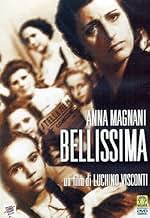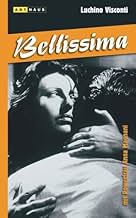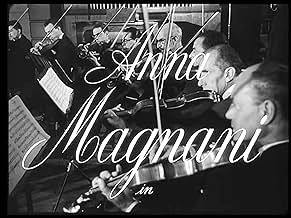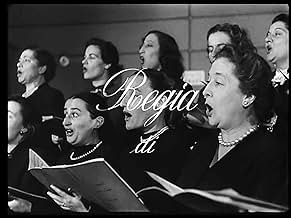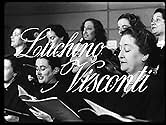Bellissima
- 1951
- Tous publics
- 1h 54m
IMDb RATING
7.7/10
5.9K
YOUR RATING
A woman from the lower class desperately tries to get her daughter into the movies.A woman from the lower class desperately tries to get her daughter into the movies.A woman from the lower class desperately tries to get her daughter into the movies.
- Awards
- 1 win & 1 nomination total
Liliana Mancini
- Iris
- (as Iris)
Vittorio Musy Glori
- Self
- (as Vittorio Glori)
Featured reviews
In "Bellissima" (1951) an overambitious mother drags her 6 year old daughter to a talent show. The theme of "Bellissima" has something in common with "Little miss sunshine" (2006, Dayton & Faris). In both cases the daughter has no chance against the barby dolls that are her opponents. In "Little miss sunshine" the initiative is however by the daughter herself (although her parents ought to do more to protect her). In "Bellissima" the initiative lays cleary by the overambitious mother.
"Bellissima" was the end of the neo realist period in the carrier of Luchino Visconti, after films such as "Ossessione" (1943) and "La terra trema" (1948). The film is situated in a workers environment but live in this environment is no longer as bad as it was in the heydays of neorealism. In fact live in the showbusiness of Cinecitta is much more ruthless.
The lead actress Anna Magnani is still a true representative of the neo realist age. Think about her role in "Roma, citta aperta" (1945, Roberto Rossellini). In "Bellissima" she is brilliant as the mother who is cheated by the Cinecitta employees but who is also cheating herself against other mothers and their "bellissima's".
The film tells a rather simple story but makes maximum use of facial expressions and close ups, especially those of Magnani herself and Tina Apicella (playing her daughter Maria). Especially towards the end of the film the close ups are tellng us more than a thousend words.
"Bellissima" was the end of the neo realist period in the carrier of Luchino Visconti, after films such as "Ossessione" (1943) and "La terra trema" (1948). The film is situated in a workers environment but live in this environment is no longer as bad as it was in the heydays of neorealism. In fact live in the showbusiness of Cinecitta is much more ruthless.
The lead actress Anna Magnani is still a true representative of the neo realist age. Think about her role in "Roma, citta aperta" (1945, Roberto Rossellini). In "Bellissima" she is brilliant as the mother who is cheated by the Cinecitta employees but who is also cheating herself against other mothers and their "bellissima's".
The film tells a rather simple story but makes maximum use of facial expressions and close ups, especially those of Magnani herself and Tina Apicella (playing her daughter Maria). Especially towards the end of the film the close ups are tellng us more than a thousend words.
It was as if I had taken a time machine back to 1951. Sitting at the open theater of Tiberina Island in Rome, Anna Magnani's voice bounced off the ancient angles of this stunning roman spot. "Bellissima" is a timeless masterpiece. A rarity in Visconti's oeuvre. He puts all of his uncanny attention to detail to the service of Magnani's bombastic, tender, funny, extraordinary performance. Visconti knew how to bring the best in his actors. Even Maria Callas who, under Visconti's guidance, went from the greatest Opera singer to the greatest actress singing Opera. There are moments in "Bellissima" that can only be described as a love letter from Visconti to Magnani and vice versa. She has a few close ups that tells us how much love, respect and admiration existed between this two enormous artists. Look at her moments in the mirror, combing her hair naturally, debating under her breath the proper pronunciation of a word. She, not a conventional beauty, looks ravishing. The message about the dangers of immediate fame and fortune could have been written today. If you have a chance, don't miss it. If you love film, it's a must!
Anna Magnani is magnificent as a pushy show-biz mother determined to get her daughter into the movies. She's like an early prototype of Bette Midler but she's more down-to-earth and with a greater propensity for feeling. (Midler could do the comedy but not the pathos). The film is charming but for a Visconti movie, it's slight. It's a great director's trifle about the movies; he enjoys poking fun at the stereotypes he's worked with in more serious films. It's laugh out loud funny.
The film doesn't offer any insights into the movie-making process and even the wheeling and dealing seems perfunctory. At times you wish maybe Visconti had gone a little deeper. (At the end he makes a point that the movies can be shallow but we know that already). Take Magnani out of the equation and there really isn't much left. She's the life-force that holds it together. It really is a great piece of acting.
The film doesn't offer any insights into the movie-making process and even the wheeling and dealing seems perfunctory. At times you wish maybe Visconti had gone a little deeper. (At the end he makes a point that the movies can be shallow but we know that already). Take Magnani out of the equation and there really isn't much left. She's the life-force that holds it together. It really is a great piece of acting.
In a post-war Italy, Maddalena Cecconi (Anna Magnani) is a woman from the lower classes abused by her husband Spartaco Cecconi (Gastone Renzelli), who is obsessed to make her young daughter Maria (Tina Apicella) a star in the cinema industry. She expects a better life for Maria, and she sacrifices her marriage and her savings paying interpretation and ballet teachers, dress, hairdresser and bribe for the small time crook Alberto Annovazzi (Walter Chiari) to make her dream come true. When the director sees the test of Maria, Maddalena realizes the reality and cruelty of the entertainment industry.
"Belissima" is a beautiful tale of disillusion. Anna Magnani has a magnificent interpretation in a role of a very poor mother and frustrated woman, spanked by her husband, trying to give a better life for her young daughter. Living nearby a movie theater, she sees the opportunity when a famous director is chasing a young talent for his next movie. Her characters gives the best effort within her short culture and vision trying to make her dream comes true, being very touching the moment when her dreams are shattered. The direction of Luchino Visconti is precise and flawless as usual, and the story is very real and credible. My vote is eight.
Title (Brazil): "Belíssima" ("Very Beautiful")
"Belissima" is a beautiful tale of disillusion. Anna Magnani has a magnificent interpretation in a role of a very poor mother and frustrated woman, spanked by her husband, trying to give a better life for her young daughter. Living nearby a movie theater, she sees the opportunity when a famous director is chasing a young talent for his next movie. Her characters gives the best effort within her short culture and vision trying to make her dream comes true, being very touching the moment when her dreams are shattered. The direction of Luchino Visconti is precise and flawless as usual, and the story is very real and credible. My vote is eight.
Title (Brazil): "Belíssima" ("Very Beautiful")
After Rome's Cinecitta Studios announces a call to cast a young girl in a movie, Maddalena Cecconi (Anna Magnani) joins a horde of other parents (mostly mothers) as she drags her daughter Maria (Tina Apicella) to the audition. Although Maria is plain, talentless, and clearly uninterested, Maddalena still pushes through in the hopes Maria raises the family to a higher station in life.
In the film's opening scene during the mass audition, director Luchino Visconti smartly uses an overhead shot of the families crowding into the studio door, much like cattle being crowded into a slaughterhouse. Like the Hollywood classic "Sunset Boulevard" released only a year earlier, "Bellissima" is a creation by the film industry about how horribly the film industry treats people. Although the story occurs at a certain place and time, its message is universal and timeless: beware of the belief that "stardom" will make life better; the relentless pursuit of it could actually make life worse.
The film begins well and its middle section is enjoyable though unexceptional. But they both build up to a final half-hour that is mesmerizing. Its denouement begins with a very clever scene involving a film editor who used to be a renowned actress. From that point and incidents that follow, Maddalena has revelations that are heart-rending and her actions are shocking.
And is it possible to praise La Grande Magnani any more than she has already been praised? I'll try. It has been said that truly great actors have the ability to captivate audiences even when reading aloud the contents of a telephone directory. Magnani could go even further than this. She could captivate an audience even while silently listening to another read to her the contents of said directory. Her face registers so much. Her performance in this film is rightly praised as one of her best. That says a lot. - dbamateurcritic
OUTSTANDING ACHIEVEMENT: Acting by Anna Magnani.
In the film's opening scene during the mass audition, director Luchino Visconti smartly uses an overhead shot of the families crowding into the studio door, much like cattle being crowded into a slaughterhouse. Like the Hollywood classic "Sunset Boulevard" released only a year earlier, "Bellissima" is a creation by the film industry about how horribly the film industry treats people. Although the story occurs at a certain place and time, its message is universal and timeless: beware of the belief that "stardom" will make life better; the relentless pursuit of it could actually make life worse.
The film begins well and its middle section is enjoyable though unexceptional. But they both build up to a final half-hour that is mesmerizing. Its denouement begins with a very clever scene involving a film editor who used to be a renowned actress. From that point and incidents that follow, Maddalena has revelations that are heart-rending and her actions are shocking.
And is it possible to praise La Grande Magnani any more than she has already been praised? I'll try. It has been said that truly great actors have the ability to captivate audiences even when reading aloud the contents of a telephone directory. Magnani could go even further than this. She could captivate an audience even while silently listening to another read to her the contents of said directory. Her face registers so much. Her performance in this film is rightly praised as one of her best. That says a lot. - dbamateurcritic
OUTSTANDING ACHIEVEMENT: Acting by Anna Magnani.
Did you know
- TriviaIn the final scene, Anna Magnani hears the film playing outside her room and remarks that she hears Burt Lancaster. Magnani would win an Oscar four years later for The Rose Tattoo, in which she would costar with Lancaster.
- ConnectionsEdited into Al Centro del cinema (2015)
- How long is Bellissima?Powered by Alexa
Details
- Release date
- Country of origin
- Language
- Also known as
- Beautiful
- Filming locations
- Ristorante Al Biondo Tevere, Via Ostiense, 178, Roma RM, Italy(Trattoria by the River Tiber)
- Production company
- See more company credits at IMDbPro
- Runtime
- 1h 54m(114 min)
- Color
- Aspect ratio
- 1.37 : 1
Contribute to this page
Suggest an edit or add missing content


